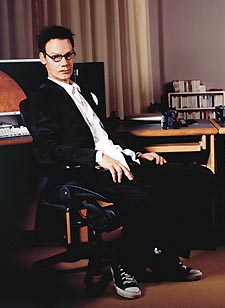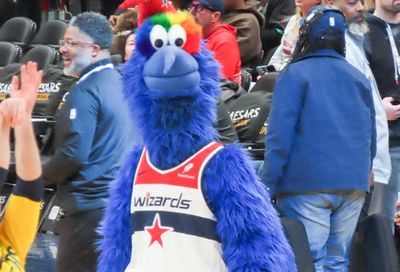Meditative Orbit
Listening to William Orbit's latest solo set, 'Hello Waveforms,' you can't help but be reminded of his past work with Madonna
Almost a decade has passed since Ray of Light shined over the music industry. Since then, Madonna and William Orbit, her Ray of Light producer, have gone their separate ways. And based on new albums from both, musically they’ve moved in opposite directions. Madonna has produced her best album since at least Ray of Light with Confessions on a Dance Floor. But in the process she lost most of the new age, ethereal sound she cultivated with Orbit to become more of a club music purveyor than ever before. Meanwhile, Orbit’s Hello Waveforms is a quiet set of dreamy atmospheric sounds suited for meditative contemplation as far away from a dance floor as possible.
Orbit has been experimenting with electronica since the 1980s as a solo artist, a band member and even a British record label owner. His original work has often veered into pretentious territory, a common problem among those in the British-dominated ambient wing of electronica, which is also known as acid house or, a bit too simplistically in the U.S., chill-out lounge. Orbit was at his most pretentious with the 2000 release of Pieces In A Modern Style, an album of ”electronic reinterpretations” of classical pieces from the likes of Beethoven, Barber, Vivaldi and John Cage.
 Kicking back: Orbit |
That he survived unharmed after creating such an uninspiring set that resembled the work of Mannheim Steamroller is a testament to how much credibility he had already built up. Since his work with Madonna, which also included her Grammy-winning single ”Beautiful Stranger” and production on 2000’s Music, Orbit has produced for other artists, including Blur, U2 and Pink. None of the work has been particularly noteworthy.
Hello Waveforms, on the other hand, is noteworthy. It proves that Ray of Light couldn’t have been made without Orbit. Orbit repeats many of the Grammy-winning sonic achievements made with that earlier work. (He also offers another classical reinterpretation, with a bit more success than before, the ”Humming Chorus” from Puccini’s Madame Butterfly.) Hello Waveforms features slowly rising electronic layers bubbling to the surface and other intriguing instrumentation keeping the music from becoming too sleepy and especially too precious.
Yet the set isn’t noteworthy as an achievement than as a mere continuation of what came before it. You can’t help but be reminded of Ray of Light: the bridge to ”Sea Green” features a similar chord progression as ”Ray of Light”; simmering ”Who Owns the Octopus?” is little more than a sequel to ”Drowned World (Substitute for Love)”; and ”Bubble Universe” sounds like ”Candy Perfume Girl” if it had been made while Orbit was under the influence of a tranquilizer.
While it might not be fair to constantly compare Hello Waveforms to Ray of Light, the comparison doesn’t always work against the new set. In fact, if you especially liked the slower cinematic and gorgeous moments on Ray of Light, then it’s not inaccurate to think of Hello Waveforms as a long-overdue follow-up album; you could call it Ray of Light Lite. The subtle, spacey set also sees the Brit, born William Wainwright, again living up to his pseudonymous last name.
And though Madonna and her musical energy is nowhere to be found, Orbit has enlisted several capable vocalists to add interest to several of the 11 tracks. Among these are the British pop darlings the Sugababes on jaunty first single ”Spiral” and Laurie Mayer, Orbit’s partner in his earlier band Strange Cargo, on two others.
Advertisement
|
Latrice Barnett would have been an inspiring choice as another guest vocalist for Orbit’s album. Barnett would have added some gravitational pull with the groovy, grounded soul house style she’s developed over the years working most frequently with Jay-J and Kaskade. Barnett enlisted those two leaders of today’s San Francisco-based soul house sound to co-produce with her new debut artist album, Illuminate. The result is a bouncy, timeless-sounding set of both relaxed and rejuvenating music that makes you feel good. Each melodious track features rich jam-band instrumentation along with computer programming. And unlike some other soul-house sets, Illuminate keeps your interest by rarely straying from compelling beats or vocals – in this case Barnett’s soft, velvety voice.
Illuminate does wear a bit thin as it goes, and it never really recovers from the underdeveloped spoken-word track ”Déjà Vu” that comes two-thirds to the end. But it starts strong with the sweet, sauntering title track and first single, and it keeps you grooving through to several other sure-to-be future dance hits. The album also includes an early Jay-J collaboration, the dance hit ”Make My Heart,” which remains one of Barnett’s best and should prove to be one of her most enduring.
Support Metro Weekly’s Journalism
These are challenging times for news organizations. And yet it’s crucial we stay active and provide vital resources and information to both our local readers and the world. So won’t you please take a moment and consider supporting Metro Weekly with a membership? For as little as $5 a month, you can help ensure Metro Weekly magazine and MetroWeekly.com remain free, viable resources as we provide the best, most diverse, culturally-resonant LGBTQ coverage in both the D.C. region and around the world. Memberships come with exclusive perks and discounts, your own personal digital delivery of each week’s magazine (and an archive), access to our Member's Lounge when it launches this fall, and exclusive members-only items like Metro Weekly Membership Mugs and Tote Bags! Check out all our membership levels here and please join us today!























